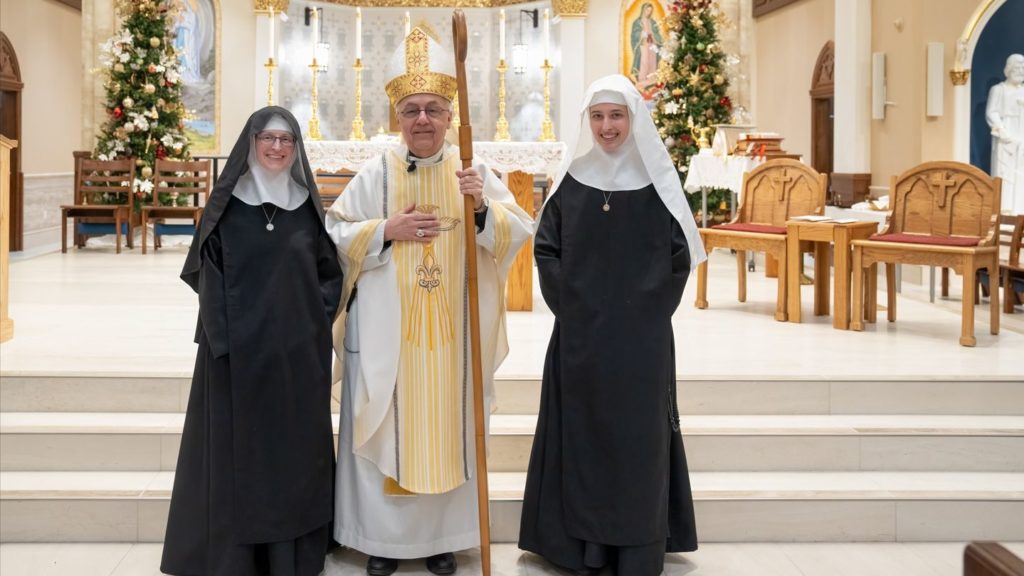When you think of Montessori education, you don’t think of Catholic nuns. But Dr. Maria Montessori wanted just that: a Catholic order of religious sisters dedicated to the education method that became her namesake.
Two years before her death, Montessori (1870–1952) expressed her wish that a religious order would exist to promote and develop Montessori-style education. More than 70 years later, the Servants of the Children of the Light is now a reality, thanks to Mother Chiara Thérèse.
Following “many years of personal discernment,” Mother Chiara brought the idea to her local Ordinary in Manden, North Dakota. Originally named Julie Jacobson, she took the name Chiara Thérèse and received her habit in 2020, taking her first vows on Jan. 3, 2021, the feast of the Epiphany.
“The Lord often brings about new religious communities in response to a need in the world at a particular moment or time in history,” she continued. “Although the Lord needs the ‘yes’ of human instruments, he works independent of us, drawing souls to live out this new form of life in the Church.”
The community was established as a Public Association of the Christian Faithful for Women in view of becoming a religious institute in the Diocese of Bismarck on Oct. 1, 2020.
“The inspiration for the founding of the community comes from the Holy Spirit,” Mother Chiara Thérèse said.
Founding a religious order is a long process, and the group currently boasts two members.
Earlier this year, on Jan. 6, Mother Chiara Thérèse professed her final vows, and novice Sister Lucia Rose received her habit during a special Mass at Our Lady of Victory Chapel on the campus of St. Mary’s Central High School in Bismarck.
“The process of beginning a new community follows the path of Christian life, and a solid foundation is necessary in order to grow and flourish,” Mother Chiara told CNA.
Though the community is small, it has received international support.
“We have been blessed to have the support of many people in the Church, far and wide; from our local bishop to the faithful in the Diocese of Bismarck, to people from all over the world,” she noted.
“I was taken aback, at the time of foundation, to hear from individuals across the world, as far away as Australia, Sweden, Wales, and Canada,” she continued. “Their voices resounded in unison as all exclaimed their joy that Dr. Montessori’s dream of a religious community was finally being realized.”
Since its establishment in 2020, the community has “had the grace of establishing ourselves in a proper convent, through the generosity of many benefactors,” Mother Chiara explained.
The Servants currently serve at Christ the King Catholic Montessori School in Mandan, a city just west of Bismarck.
“We continue to form young people — body, mind, and soul — through this method of education,” she said. “The early years of formation of the young sisters takes place at our convent. After the profession of simple vows, the sisters will pursue an AMI Montessori diploma, according to the age of the children they feel called to serve.”
“We continue to be open to what the Lord is asking of us and pray that we can remain faithful to the call we have received,” she noted.
Dr. Maria Montessori’s name has become synonymous with a style of education for children that is tactile, playful, and practical. It’s designed for the developmental needs of the child.
“Dr. Montessori desired that the child be respected and honored in this world, so often made only for adults,” Mother Chiara explained. “Therefore, from her we draw our deep desire to not only assist the child but to understand and respect the child in all his moments of development.”
Montessori became the first female doctor in Italy and studied psychiatry with a focus on education. In 1907, she opened a child care center in Rome,“Casa dei Bambini” — Italian for “Children’s House,” where she worked with disadvantaged children.
Catholic religious education was initially an integral part of Maria Montessori’s educational program, but as secular Montessori schools were established in the U.S., the religious element was dropped from the curriculum.
“We know that Dr. Montessori was a devout Catholic. In fact, she said, as E.M. Standing recounts, that ‘her own method could only find its fullest expression when applied to the teaching of the Catholic faith,’” Mother Chiara explained.
“In 1950, two years before her death, Dr. Montessori spoke of her desire for a religious community to carry out her work,” she continued. “She was convinced that she alone could do little in comparison to how a religious community could spread her work throughout the world.”
Dr. Montessori wished for the community to be called “The Servants of the Children of Light.”
“Therefore, it is her desire that is finally being realized after all of these years!” she noted.
Mother Chiara explained the Montessori “learned much” from the Catholic Church “as she formulated and developed her method of education,”
“Dr. Montessori also believed that ‘the true respect of the child is only possible when one respects God in the child,” Mother Chiara noted, citing her own translation of “Dio e il Bambino,” (“God and the Child”), a book of Montessori’s writings that have not been fully translated into English yet.
“From this flows our community’s unique fourth vow: to serve Christ in the child. We do so not only to safeguard our charism but also to truly serve the child as Dr. Montessori prescribes in her method,” Mother Chiara continued. “She said that a Montessori guide (or teacher) must root out all pride, impatience, and anger if he is truly going to lead the child to develop into the ‘man he is to become.’ ”

